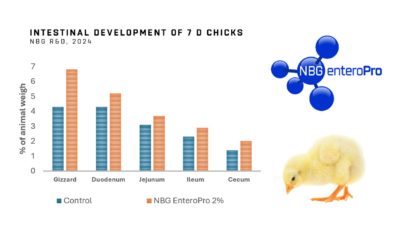Enzymatic hydrolysates of fish in broiler chicken feed: A nutritional enhancer

Dear colleagues,
Fish protein hydrolysates (FPH) are gaining attention as valuable ingredients in animal nutrition, specifically in broiler chicken feed, offering several advantages. Let’s take a look at what they are and how they can improve the health and performance of broiler chickens.
What are fish protein hydrolysates?
Fish protein hydrolysates are obtained from fish or fish materials through protein hydrolysis. This process breaks down proteins into smaller components, including peptides and amino acids. Fish protein hydrolysates can be obtained from various fish sources, such as by-products or whole fish. These hydrolysates contain bioactive peptides with functional properties that go beyond their nutritional value.
Benefits of enzymatic fish hydrolysates in broiler chicken feed
- Growth enhancement: The inclusion of HPP in broiler diets has been associated with good growth performance indices. The small peptides and amino acids are easily absorbed in the small intestine, providing a balanced nutrient pattern for optimal growth.
- Increased feed efficiency: Broiler chickens fed diets containing HPP show increased feed efficiency. Hydrolyzed proteins contribute to improved nutrient utilization, leading to efficient conversion of the entire diet.
- Health benefits: Some HPPs have bioactive properties, such as antimicrobial, antioxidant, and immunomodulatory activities. These contribute to the overall health of broiler chickens, particularly intestinal health.
- Functional properties: HPPs can improve the functional properties of broiler chicken meat, making it more suitable for processing and consumption.
At NBG, we have developed NBG DigestaPro and NBG EnteroPro, two fish hydrolysates that have repeatedly demonstrated their power to improve animal performance and health, as shown in the graph attached to this short article.
For more information you can contact us:
Conclusion
Fish enzyme hydrolysates hold promise as valuable components of broiler chicken feed. Their bioactive properties, improved growth performance, and health benefits make them an attractive option for optimizing broiler nutrition.

